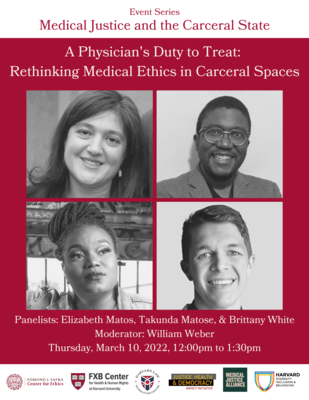A Physician’s Duty to Treat: Rethinking Medical Ethics in Carceral Spaces

Event Description
Incarcerated people in the U.S. suffer disproportionately from chronic health conditions, their acute medical needs often go unmet, and the carceral healthcare system that serves them is set up to fail by a lack of resources and infrastructure. The pandemic has only magnified the health crisis that is the norm in the U.S. prison system.
The second of the four-part event series, “Medical Justice and the Carceral State,” aimed to encourage collaboration between health and legal experts, raise awareness about healthcare disenfranchisement in carceral settings, and showcase the material change that is possible through public interest law and medical partnerships.In this second panel discussion, the conversation covered legal remedies for those experiencing health concerns in carceral settings, the need for expert medical witness testimony, and introduce the obligation that healthcare providers have to provide care beyond the bedside.
Panelists
- Elizabeth Matos, Executive Director of Prisoner’s Legal Services of Massachusetts
- Takunda Matose, Assistant Professor of Philosophy, Loyola University Chicago and 2021-22 Edmond J. Safra/Center for Bioethics Joint Fellow-in-Residence
- Brittany White, Organizing Fellow at the Institute to End Mass Incarceration and Decarceration Campaign Manager for LIVE FREE
- Moderator: William Weber, Emergency physician at the University of Chicago and National Medical Director of the Medical Justice Alliance
This series is co-sponsored by the Justice, Health, and Democracy Impact Initiative of the Edmond J. Safra Center for Ethics; the Medical Justice Alliance; the Harvard FXB Center for Health & Human Rights; the Office of Equity, Diversity, Inclusion and Belonging at Harvard University; and the Petrie-Flom Center for Health Law Policy, Biotechnology, and Bioethics at Harvard Law School.